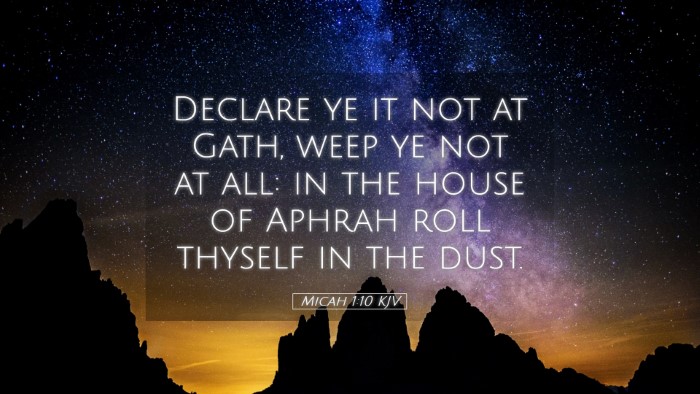Old Testament
Genesis Exodus Leviticus Numbers Deuteronomy Joshua Judges Ruth 1 Samuel 2 Samuel 1 Kings 2 Kings 1 Chronicles 2 Chronicles Ezra Nehemiah Esther Job Psalms Proverbs Ecclesiastes Song of Solomon Isaiah Jeremiah Lamentations Ezekiel Daniel Hosea Joel Amos Obadiah Jonah Micah Nahum Habakkuk Zephaniah Haggai Zechariah MalachiMicah 1:10
Micah 1:10 KJV
Declare ye it not at Gath, weep ye not at all: in the house of Aphrah roll thyself in the dust.
Micah 1:10 Bible Commentary
Commentary on Micah 1:10
Micah 1:10 reads: "Declare ye it not at Gath, weep ye not at all: in the house of Aphrah roll thyself in the dust." This verse, extracted from the prophetic thrust of Micah, calls for an introspective and sober reflection on the impending judgment of Judah. Micah addresses the people in a manner that is both poignant and instructive, utilizing various themes of mourning, lamentation, and warning.
Contextual Overview
The Book of Micah is a profound commentary on the socio-political and spiritual failings of God's chosen people during a time of moral decay. The prophet Micah emerges as a voice of conviction, calling attention to injustices and warning of divine judgment. The backdrop of this particular verse centers around the Assyrian threat and the consequences that Judah will face due to its sins.
Thematic Insights
1. The Call to Silence and Mourning
Micah begins with an exhortation not to publicize the calamities that are to come. The specific mention of Gath, a Philistine city, implies a warning against triumphalism and an admonition to avoid gloating over the misfortunes of others. Matthew Henry elaborates that this exhortation arises from a sense of impending judgment that should provoke humility rather than arrogance.
- Humility in Judgment: The sorrow that is expected in the face of judgment should be internalized within the community, calling for a genuine response to God’s righteous displeasure.
- Private Lamentation: The phrase “weep ye not at all” emphasizes a specific mourning when a collective sin finds its manifestation in divine wrath.
2. The Symbolism of Dust Rolling
The imagery of rolling in dust seen in “in the house of Aphrah roll thyself in the dust” serves as a potent symbol of mourning and disarray. Adam Clarke notes that this act was a traditional expression of grief, representing complete submission to divine decree and an acknowledgment of sinfulness.
- Spiritual Brokenness: By rolling in dust, the people are symbolically stripped of pride and self-sufficiency, confronting their unworthiness.
- Cultural Significance: In ancient Near Eastern societies, acts of mourning were deeply engrained as community responses, establishing a connection with shared truths around sin and its consequences.
3. Geographic and Symbolic Significance
Understanding the significance of Aphrah as a location deepens the interpretative scope. As Matthew Henry explains, the name Aphrah alludes to a place synonymous with dust—an appropriate symbol of humanity's frailty before God's greatness.
- Integrity of Place: The choice of locally significant sites for the prophet’s declarations evokes a more profound awareness among the people, rooting their lamentation in geographic and historical realities.
- Divine Disruption: Micah’s reference to a specific location indicates that divine judgment disrupts not only the people's lives but also the very fabric of their habitual engagements with their territory and community.
Theological Implications
The theological underpinnings of Micah 1:10 highlight God’s sovereign authority and the necessity for human responses to divine revelation. The call to mourn serves as a precursor to repentance, acknowledging the gravity of sin and the consequence of turning away from God’s covenant.
- Repentance and Restoration: The mourning that Micah calls for is not mere sorrow but is a call for restoration through genuine repentance, illustrating God’s desire for His people to return to Him.
- The Nature of Prophetic Ministry: Micah reflects the role of the prophet as both a bearer of bad news and a hope-giver, emphasizing that even amidst proclamation of impending doom, restoration is possible through sincere contrition.
Application for Modern Readers
This verse resonates with contemporary themes of accountability, humility, and the need for collective introspection in the Church today. As we reflect on our corporate identity in light of God's righteousness, Micah's call invites us to:
- Embrace Humility: Recognize our need for God's grace and the necessity of avoiding self-righteousness.
- Participate in Genuine Lamentation: Engage in communal expressions of grief over sin and injustice, fostering a culture of accountability and repentance.
- Seek Restoration: Move towards restoration in our relationship with God and one another, aspiring to live in fidelity to the divine will.
Conclusion
Micah 1:10 serves as a compelling reminder of the call to authentic and visceral responses to God’s word. The collective silence and mourning requested by Micah challenge modern believers to confront their inadequacies while fostering a spirit of humility and repentance. As we glean insight from the collective wisdom of biblical commentators, let us approach this scripture with a sense of reverence for the serious nature of sin and the boundless grace found in returning to God.


